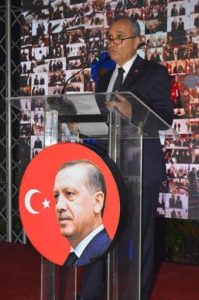Documents obtained by Nordic Monitor show that Turkish Embassy in Senegal spied on Turkish citizens in the country and forwarded the illegal profiling list to Ankara, which led to the launch of groundless judicial procedures against them.
According to a December 12, 2018 decision by prosecutor Birol Tufan, the Ankara Chief Public Prosecutor’s Office launched a separate investigation (file no.2018/27354) into 14 Turkish nationals who were listed in espionage files dispatched by Turkish diplomats in Senegal without any concrete evidence of wrongdoing. They were charged with “membership in a terrorist group” by Tufan.
Judicial document dated December 12, 2018 reveals spying on critics .(The addresses and names of the Turkish nationals have been redacted for security reasons.):
The profiling documents may have been sent to Ankara by Nilgün Erdem Arı or Nihat Civaner, who were the Turkish ambassadors to Senegal between 2014 and 2019.

Critics of the Erdoğan government abroad, especially members of the Hizmet/Gülen movement, have been facing surveillance, harassment, death threats and abduction since President Recep Tayyip Erdoğan decided to scapegoat the group for his own legal troubles. They have often been denied consular services such as power of attorney and birth registry, as well as having their passports revoked. Their assets in Turkey are seized and their family members at home risk criminal charges.
Orhan İnandı, the founder and president of the Turkish-Kyrgyz Sapat school network operating in Kyrgyzstan, has been missing in Bishkek for 21 days and is feared to have been abducted by Turkey’s National Intelligence Organization (MİT) due to his alleged links to the Gülen movement. İnandı was included in a similar profiling document that was sent to Ankara by the Turkish Embassy in Bishkek.

It is also known that Turkish embassies are spying on the private and confidential information of citizens who have registered for consular services. Nordic Monitor this week published a Turkish foreign ministry communiqué, stamped secret, showing that the Turkish Embassy in Kosovo profiled 78 people who had listed their professions as teachers when they made applications with the consulate for various citizen services. Similar work has apparently been done in other Turkish diplomatic missions at the request of the Security General Directorate (Emniyet), the main law enforcement agency in Turkey, which was politicized with a mass purge of some 30,000 officers from the police force.
As previously disclosed by Nordic Monitor, the foreign ministry sent lists of profiled Turkish nationals in two CDs to the Ankara Chief Public Prosecutor’s Office, the national police and Turkey’s intelligence agency MIT on February 19, 2018 via an official document for further administrative or legal action, the punishment of their relatives back in Turkey and the seizure of their assets.
Public prosecutor Adem Akıncı, who received the foreign ministry document on February 23, 2018, forwarded the classified CDs including information on 4,386 Erdoğan critics to the Organized Crimes Unit of the Ankara Police Department for further action. The police conveyed the results of its investigations to the public prosecutor.
According to judicial documents released by the Ankara 4th High Criminal Court on January 16, 2019, the foreign ministry compiled a long list of foreign entities that were owned and/or operated by people who were seen as close to the movement.
Moreover, Nordic Monitor revealed how MIT infiltrated refugee camps in Greece in order to spy on opponents who were forced to flee to Greece to escape an unprecedented crackdown in neighboring Turkey.
Foreign Minister Mevlüt Çavuşoğlu confirmed systematic spying on Turkish government critics on foreign soil as by Turkish diplomatic missions in February, 2020. Çavuşoğlu said Turkish diplomats assigned to embassies and consulates have officially been instructed by the government to conduct such activities abroad. “If you look at the definition of a diplomat, it is clear. … Intelligence gathering is the duty of diplomats,” Çavuşoğlu told Turkish journalists on February 16, 2020 following the Munich Security Conference, adding, “Intelligence gathering and information collection are a fact.”












